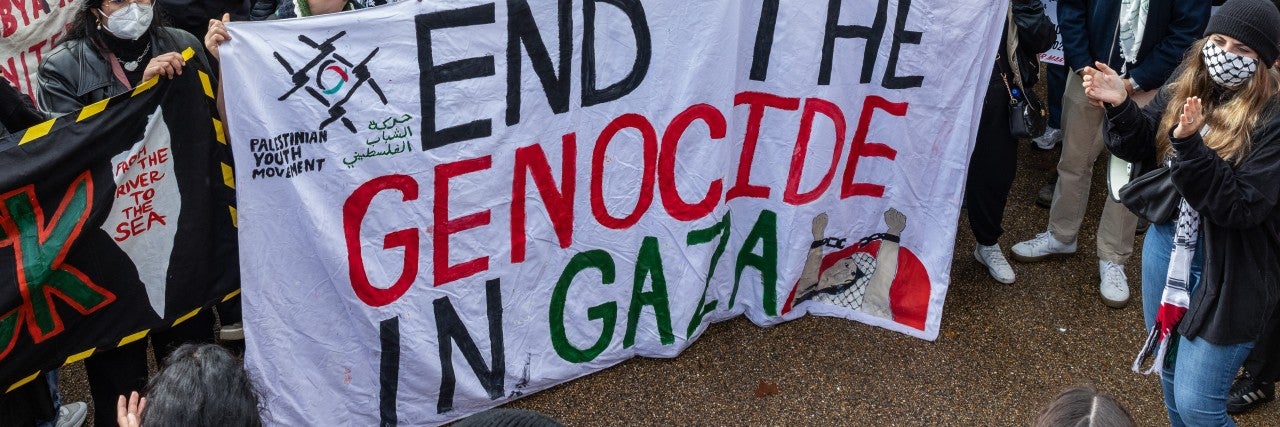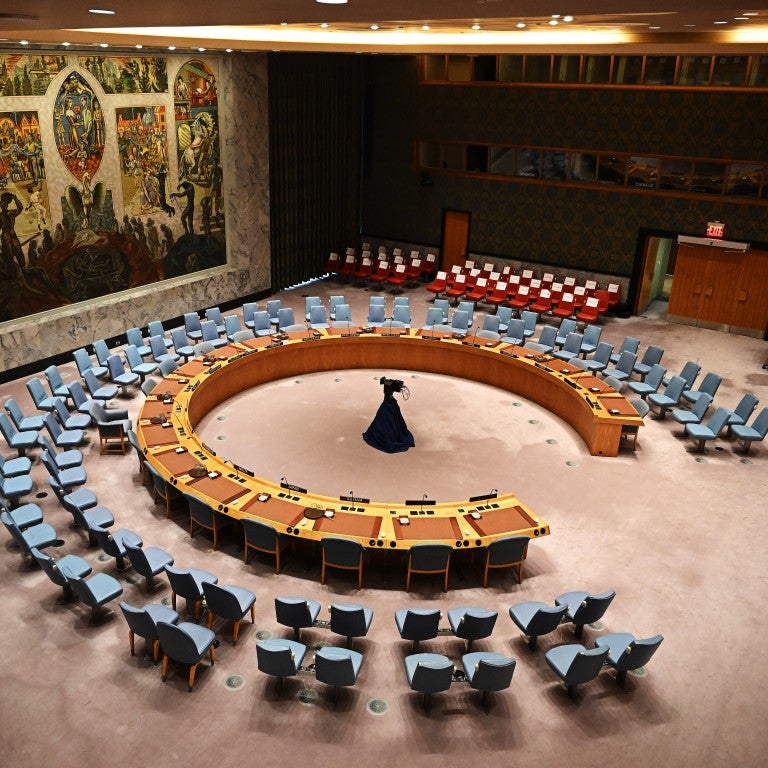December 5, 2024
Update — December 5, 2024: AJC vehemently rejects the biased report by Amnesty International accusing Israel of committing genocide against the Palestinians. Read our full statement.
As images and accounts of human suffering in Gaza and southern Israel dominate headlines and social media, anger continues to grow.
Each civilian death is a tragedy and when those tragedies occur, calls for holding those responsible are understandable.
Israel’s military operation to defend itself after Hamas’ October 7 atrocities, has been falsely described as genocide against the Palestinians. Such accusations of genocide pervade the scholarly discourse, social media, the vitriol of anti-Israel protesters, and even a spurious accusation filed by South Africa in the International Court of Justice.
Few claims are more offensive and blatantly wrong.
The modern-day Jewish state was created after the Nazis committed the genocide known as the Holocaust, murdering six million Jews who had nowhere to go and no place to call home because there was no Israel.
Of course, the implied hypocrisy that the survivors of genocide are now committing one of their own makes for a powerful talking point in the war of words surrounding the conflict between Israel and Gaza. But it’s simply not true.
Even worse, charging Israel with genocide gives a free pass to the Hamas terrorists who are deliberately engineering the immense harm that innocent Palestinians are experiencing today.
Here are five reasons why the use of the term genocide to describe Israel’s self-defense campaign is inaccurate, misleading, and dangerous.
1. “Genocide” refers to the physical destruction of an entire group in whole or in part that has been targeted on the basis of its identity. This is not Israel’s objective in Gaza.
Raphael Lemkin, a Polish lawyer of Jewish descent, introduced the term genocide in 1944 to refer to events including the Nazis’ systematic extermination of Jews.
Lemkin explained the need for a new legal term to describe this horror, saying: “there has been no serious endeavor hitherto to prevent and punish the murder and destruction of millions.... there was not even an adequate name for such a phenomenon.”
The United Nations General Assembly recognized genocide as a crime under international law in 1946 and it was codified in the Convention on the Prevention and Punishment of the Crime of Genocide in 1948.
The Convention defines genocide as the commission of grave harm against members of a national, ethnic, racial or religious group - such as by killing, causing serious physical or mental harm, inflicting conditions that bring about physical destruction, imposing measures to prevent births or forcibly taking away children - with the intent to destroy the group as such.
Genocide means targeting members of a group because of their group identity and not something they are individually thought to have done.
Israel’s war is against Hamas: Israel is not seeking to destroy the Palestinian people or the Palestinian population of Gaza, which is what would need to happen in order to correctly apply the term “genocide.” Israel’s leaders have repeatedly asserted that their campaign in Gaza is solely against the terrorist organization Hamas. In fact, this type of military campaign is the exact opposite of reflecting an attempt to eliminate the Palestinian population.
Furthermore, on occasions in which Israeli officials have made statements reflecting callous disregard for Palestinian civilian lives, they have been disciplined and the IDF has reiterated that it has no wish to harm innocents.
2. Israel is responding to a genocidal attack by Hamas
Since October 7, Israel’s objective in Gaza has been to destroy Hamas, a terrorist organization that carried out an unprecedented and brutal massacre against its people, including infants, children, elderly and disabled people. The goal of Hamas is to wipe Israel and Jews off the map, and its representatives have recently reiterated that they will never stop pursuing it. That’s an example of genocidal intent.
Expose this false claim
Israel is fully justified in using military force to respond to Hamas’s October 7 attack (read AJC’s explainer on Israel, Hamas, and international law). Given the extent of the damage the Iran-backed terror group inflicted and the nature of Hamas’s genocidal intentions, Israel’s goal of eliminating the terrorist group entirely is appropriate, and its use of significant force (which always must be directed at legitimate military targets) to achieve is compatible with the requirement of proportionality. Israel’s use of military force in Gaza in the face of such a threat is not evidence of genocide, but completely consistent with international law.
3. Israel’s actions reflect its desire to spare Palestinian civilians from harm, not to deliberately harm them
The humane practices of the IDF disprove claims of genocidal intent, as the Israeli military sends Arabic-language warnings to Gazans prior to its airstrikes on terrorist infrastructure and legitimate military targets in the coastal enclave.
Humanitarian corridors: In fact, Israel called for the temporary evacuation of the local population in the northern part of the Gaza Strip, and delayed its ground operation in Gaza for weeks to allow civilians time to heed Israel’s warnings. Before and since it has continued to go to great lengths to indicate safe routes for Palestinian civilians to relocate from northern Gaza. Israel has made it clear to residents that Gaza City has become a battle zone because Hamas terrorists are hiding in terror tunnels located under civilians’ houses and has repeatedly stated that residents of northern Gaza will be able to return to the area when conditions permit.
Far from reflecting genocidal intent, Israel’s temporary relocation of Palestinian civilians out of northern Gaza reflects an intention to ensure they are out of harm’s way as it undertakes a legitimate military campaign to destroy Hamas’s terrorist infrastructure, which unfortunately is embedded in and under civilian areas in Gaza.
Moreover, since October 17, Israel also has allowed more and more humanitarian aid deliveries for Palestinians to enter through the Rafah crossing, further refuting the suggestion that its limitations on the entry of aid and supplies for Palestinians have any purpose other than to deprive Hamas of the ability to resupply and continue its attacks against Israel.
4. Hamas’ actions are designed to cause harm to Palestinian civilians and blame Israel
Israel has a right to defend itself within the bounds of international conventions and law from the thousands of Hamas missiles that have been fired on Israeli towns and cities since October 7. Those missiles don’t originate from military bases, as international law dictates. They are fired from civilian neighborhoods in the Gaza Strip, and from inside, next to, and underneath nominally civilian areas in Gaza like residential buildings, schools, mosques, and hospitals. When Hamas takes these actions it transforms what were once protected civilian sites into legitimate military targets.
Hamas puts civilians in harm’s way: While Israel goes to great lengths to avoid harming civilians as it targets Hamas’s weapons and operations centers in Gaza, Hamas typically proceeds to place Palestinian civilians directly in the path of the IDF’s targets. It has repeatedly called on Palestinian civilians to ignore Israel’s warnings about impending strikes and reportedly forced civilians to remain in the vicinity of military objectives, using them, like its hostages from Israel, as human shields.
Hamas’ actions are not only aimed at protecting its leaders, weapons, and property but also at vying for leverage in the public opinion war by inflating the number of civilian casualties.
Through its actions in Gaza, Hamas greatly increases the likelihood that military actions by Israel that are permissible in war and not prohibited by the law of war - let alone by the Genocide Convention - will nevertheless result in some harm to civilians. International law does not prohibit Israel from attacking legitimate military targets even when it is possible or likely that some civilian harm will result - unless the expected civilian harm will clearly exceed the anticipated military advantage from the attack.
While Israel takes many steps to minimize civilian harm resulting from its attacks against Hamas targets, as much as it can, it cannot eliminate it entirely. This is a horrible outcome of war, but it is not illegal, and it certainly is not genocide.
5. The “facts” of the genocide charge don’t add up
Those who claim that Israel is committing genocide in Gaza not only misunderstand the legal definition of genocide and what the laws of war permit; they also base the charge on unsubstantiated claims.
It is unquestionable that many civilians in Gaza have died and even more have suffered immensely since October 7. However, there are so many “unknowns” with an important bearing on Israel’s conduct in this war that it is impossible to say with certainty that it is acting wrongfully.
- The number of “innocents” vs. terrorists that have died: This is impossible to know given that the Ministry of Health in Gaza is under the control of and susceptible to influence by Hamas, and does not separate innocent civilians from fighters in its announced death tolls.
- The circumstances in which numerous innocents have been killed in Gaza: This includes whether they died because of attacks carried out by the IDF or because of intentional or unintentional harmful actions by Hamas or other Palestinian armed groups. A key example is the explosion at Al-Ahli Arab Hospital in Gaza City, which the U.S. and other governments have determined was caused by a failed rocket fired by Palestinian Islamic Jihad and not, as Hamas, the Hamas-controlled Ministry of Health in Gaza, and many other sources claimed, by the IDF.
- The nature of the military objective of attacks carried out by the IDF in which Palestinian civilians have died: Given that it is not possible for independent assessments to be conducted into whether a Hamas leader, tunnel, and/or weapons cache was present at the site of any specific IDF attack in Gaza, which Hamas still largely controls.
While some of those who claim Israel is engaged in genocide in Gaza are doing so for malign purposes - for example, justifying Hamas' October 7 massacre by claiming Israel is ‘worse,’ many others have been deliberately misled. Their goal of ending the suffering of Palestinians in Gaza would be far better served by placing blame for that suffering where it lies - with Hamas - and supporting efforts to bring about its defeat so that Palestinian and Israeli civilians can have the peace and security they all deserve as quickly as possible.





